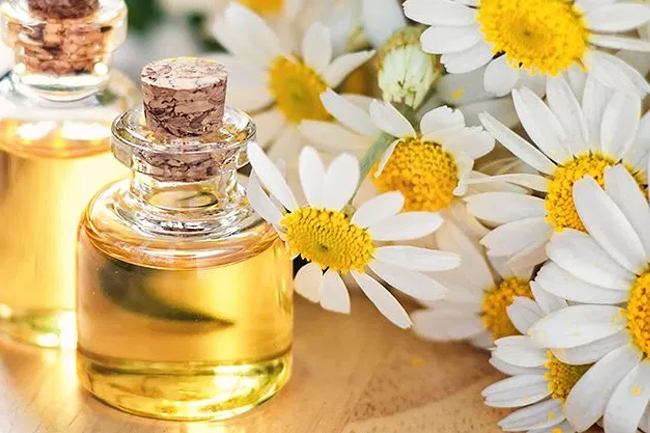
The link between plants and human health has been documented for thousands of years. . The everlasting popularity of herbal medicines may be explained by the tendency of herbs to work slowly, usually with minimal toxic side effects. One of the most common herbs used for medicinal purposes is chamomile whose standardized tea and herbal extracts are prepared from dried flowers of Matricaria species. Chamomile is one of the most ancient medicinal herbs known to mankind. It belongs to Asteraceaefamily. The dried flowers of chamomile contain many terpenoids and flavonoids contributing to its medicinal properties Chamomile is one of the oldest, most widely used and well documented medicinal plants in the world and has been recommended for many health applications. Chamomile is known to be used in various forms of its preparations.In our oil extract taking consideration of consumers need oil is enriched for the phytocostituents which are useful.
The plant contains volatile oil, composed of a variety of separate oils. The principal components of the essential oil extracted from the German chamomile flowers are the terpenoids α-bisabolol and its oxide azulenes including chamazulene and acetylene derivatives. It also contains farnesene and α-pinene. Both α-bisabolol, bisabolol oxides A and B and chamazulene or azulenesse, farnesene and spiro-ether quiterpene lactones, glycosides, hydroxycoumarins, flavanoids (apigenin, luteolin, patuletin, and quercetin), coumarins (herniarin and umbelliferone), terpenoids, and mucilage are considered to be the major bio-active ingredients. Other major constituents of the flowers include several phenolic compounds, primarily the flavonoids apigenin, quercetin, patuletin as glucosides and various acetylated derivatives. Among flavonoids, apigenin is the most promising compound. It is present in very small quantities as free apigenin, but predominantly exists in the form of various glycosides.
Chamomile oil is cost effective and biologically potent with formulation application as follows:
collection of raw material from grass root cultivation sources in proper season from specific regions of India. Authentication and Standardization of botanical species carried out respectively.
Our organization adopted USP based methods for oil extraction to maintain quality, safety & efficacy of our product by following GMP. For enrichment of natural oil we optimized & monitored critical process parameters to achieve desire end product which conserve its natural aroma and taste to satisfied consumers need. Product Processed & stored under strictly hygienic production environment.
Phyto Life Science is always ‘taking consideration of consumer’s requirement by providing them versatile products with below unique features:
Oil & oil soluble extract version available
Important Note :-The information presented in this is for informational, reference and educational purposes only and should not be interpreted as a substitute for diagnosis and treatment by a health care professional. Although, the information presented about product is based on material provided by researchers and sources deemed reliable, we do not presume to give medical advice. The information presented here is the base on various Ayurveda & other book references and some market literatures and books and published papers. Anyone wishing to use this information should share it with his or her health care provider before embarking on any therapeutic program. It is your responsibility to discuss any alternative or natural remedy with your health care provider before use.